Share

TechTank
California Congressman Ted Lieu talks about the state of AI governance
Season 4, Ep. 8
•
In this episode of the TechTank Podcast, co-host Nicol Turner Lee speaks to Congressman Ted (D-CA) about these and other areas concerning AI regulation, oversight, and guidance in the United States. They also discuss how AI’s regulation from other countries will influence national policymaking.
More episodes
View all episodes

36. Tech outlooks for 2026
35:32||Season 5, Ep. 36From advances in generative AI to crackdowns on kids' use of social media, various discussions around technology are likely to continue or expand in 2026. This includes questions about how states and the federal government might regulate these technologies and what areas will be at the forefront of legislation. In this episode, co-hosts Darrell West and Nicol Turner Lee share their thoughts on what's ahead for tech in 2026.
35. Universities tackled digital inclusion—now they are accelerating AI use
46:50||Season 5, Ep. 35Some surveys show the majority of college students are using AI for academics, and several institutions are also embracing the technology, looking for the best ways to make the technology accessible and understandable for all. In this episode, co-host Nicol Turner Lee is joined by Lev Gonick to discuss these efforts and how they connect to prior work around digital inclusion.
34. Why water is important for data centers
25:19||Season 5, Ep. 34Data centers are crucial for AI, but with thousands of file servers, they also require large amounts of energy and water. As more facilities are built, it’s important to understand this usage and how it might affect surrounding communities. In this episode, co-host Darrell West is joined by Joseph Kane to discuss how data centers use water and the policy questions surrounding these resources.
33. 'Navigating Technology and National Security’ with author Justin Sherman
40:22||Season 5, Ep. 33Many of today’s conversations about AI and emerging technologies are increasingly driven by questions about national security. These conversations are the latest in a longstanding debate over how the government uses a complex set of regulatory tools to protect critical technologies. In this episode, co-host Nicol Turner Lee is joined by Justin Sherman to discuss these patterns and his new book, “Navigating Technology and National Security.”
32. 'Wired Wisdom': A conversation with author Eszter Hargittai on older populations
37:16||Season 5, Ep. 32As the internet emerged, so did stereotypes about older people's use of it. Yet research has countered some of these common beliefs and led to greater understanding of these generations' online activity. In this episode, Nicol Turner Lee speaks with Eszter Hargittai, the co-author of "Wired Wisdom: How to Age Better Online," about these findings and more.
31. The Age of Extraction: A discussion on Tim Wu's new book
36:46||Season 5, Ep. 31Marketplaces look different in the digital age and are controlled by a few large companies with immense economic and cultural power. Co-host Nicol Turner Lee is joined by legal scholar and tech expert, Tim Wu, to discuss his new book, “The Age of Extraction” and the future of these platforms.
30. Why data centers are important for AI
38:42||Season 5, Ep. 30AI is the transformative technology of our time, yet undergirding the growing use of AI is the need for state-of-the-art data centers that host the file servers and networking equipment that store, process, and analyze information. In this episode, Nicol Turner Lee and Darrell West discuss what data centers are, their number and distribution, barriers to development, and ways to overcome those challenges.
29. On European digital sovereignty and platform regulation with Marietje Schaake
32:36||Season 5, Ep. 29Europe created regulatory frameworks, including the Digital Markets Act and the Digital Services Act, in attempt to reassert control, but these laws have recently faced backlash from the Trump administration. In this episode of the TechTank podcast, Courtney Radsch speaks with Marietje Schaake about these challenges and the digital sovereignty debate.
28. Will AI democratize financial services?
34:49||Season 5, Ep. 28Financial services have long relied on artificial intelligence (AI) and machine learning for a range of duties, from administrative tasks to decision-making, but these uses can have major implications for consumers subject to the technology’s decisions. In this episode, Nicol Turner Lee speaks with Aaron Klein about these consequences and the importance of oversight in deploying these technologies.